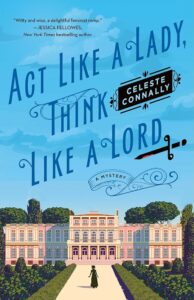Lady Petra Inquires #1
 Joining the now crowded regency mystery field, Celeste Connally manages to make her entry a stand out in her series debut. Set in 1815, Lady Petra Forsyth has declared to all of society that she plans to remain unmarried. Unusually for the time, she has her own monies left to her by her mother, and she’s mourning not only a dead fiancé but the loss of her dearest childhood friend, Duncan Shawcross. The two were raised together and parted on a terrible note after the death of Petra’s beloved, who was also Duncan’s best friend.
Joining the now crowded regency mystery field, Celeste Connally manages to make her entry a stand out in her series debut. Set in 1815, Lady Petra Forsyth has declared to all of society that she plans to remain unmarried. Unusually for the time, she has her own monies left to her by her mother, and she’s mourning not only a dead fiancé but the loss of her dearest childhood friend, Duncan Shawcross. The two were raised together and parted on a terrible note after the death of Petra’s beloved, who was also Duncan’s best friend.
It’s now three years later and the two meet up again at a huge ball. They seem determined to remain prickly toward one another (or at least Petra seems determined). More importantly, however, Petra is fending off veiled and not so veiled insults from some of the titled men in her circle regarding her announcement of intentional spinsterhood. She’s also puzzled about the recent sudden death of a friend, whom a footman at the ball claims to have seen recently – after her purported death date. This is something Petra wants to pursue.
Through a series of machinations, she arranges to “run into” the footman on Rotten Row, the daily London perambulation for fancy horses. Petra loves to ride (and even scandalously rides astride in breeches when she’s at home). She does “run into” the footman, but he’s dead, and this launches an entirely new inquiry, colored now by Petra’s guilt as she feels responsible for his death.
Petra is a fabulous character, a descendant of Deanna Raybourn’s delightful Veronica Speedwell. She knows what she wants and she knows how to go about getting it – mostly. There would be no story if there weren’t some obstacles, and there are some here. For one thing, there’s her judgy uncle. For another, she’s finding a pattern of missing high born wives, those considered problematic for various reasons, including her dead, or not dead, friend. The more she looks into it, the more alarmed she becomes. It also becomes apparent that as free and strong minded as she might be, in 1815, men were in control of things in every possible way.
The investigation draws in an assortment of interesting characters, Duncan included, but also a street urchin named Teddy, Petra’s maid, Annie, her best friend, Caroline, and an interesting female herbalist and pharmacist who is drawn into their circle for various reasons which I won’t give away.
Connally has written a vivid and gripping story, which is one part adventure, one part romance, and one part a look at a horrible underbelly of society, a la Anne Perry. It was so suspenseful toward the end that I couldn’t stop reading. It’s also a lightish but still serious look at the gender-based power divisions in 1815 London. I once heard Laurie King say that writing about the past really means writing about the present, and there are some real echoes of the present here, especially in the societal division Connally is depicting between open minded and more conventional thinkers.
There’s a hard to describe feel of a book that really succeeds in what it’s set out to do. Everything hangs together. It draws the reader in. The story blooms organically, from one plot point to the next. The reader becomes invested in the character or characters, and the writing needs to have just a bit of sparkle. Connally has truly succeeded in delivering a sparkling read. — Robin Agnew